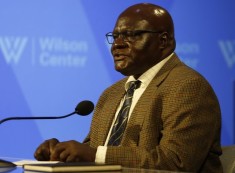-
Gordon Mumbo on Water and Livelihoods in the Mara River Basin
November 15, 2019 By Benjamin Dills“If you live in the developed world or in some urban centers, then the supply of water is guaranteed,” said Gordon Mumbo, team leader for Sustainable Water for the Mara River Basin, a project of Winrock International and USAID’s Sustainable Water Partnership, in this week’s Water Stories podcast. When you wake up, you expect water to flow from your tap. “If you don’t find it flowing, you get upset and will probably call the utility company.” But people living in the Mara River Basin don’t have that luxury. “They have to walk to the river to get water and bring it home,” said Mumbo.
“If you live in the developed world or in some urban centers, then the supply of water is guaranteed,” said Gordon Mumbo, team leader for Sustainable Water for the Mara River Basin, a project of Winrock International and USAID’s Sustainable Water Partnership, in this week’s Water Stories podcast. When you wake up, you expect water to flow from your tap. “If you don’t find it flowing, you get upset and will probably call the utility company.” But people living in the Mara River Basin don’t have that luxury. “They have to walk to the river to get water and bring it home,” said Mumbo.
With the Sustainable Water Partnership project, Mumbo is working to make sure the Mara River keeps flowing and meets the demand for water. A cornerstone of the project is determining how much water is available and how much water the basin needs. Mumbo and his colleagues are working across Kenya and Tanzania on a water location plan that considers how much water is needed to sustain the environment, the people, and the wildlife, said Mumbo. Once they are able to identify the gaps between supply and demand, they will be better positioned to manage the river.
The project is also working to preserve the watershed by creating livelihoods that don’t require cutting trees and other vegetation. With a high demand for honey in the region, beekeeping has been one of their successful alternative livelihoods. “One would not want to cut down a tree where a beehive is kept,” said Mumbo.
When the Mara River Basin project started, there was no adequate platform for private investment, said Mumbo. He and his colleagues helped the private sector organize to invest in water management. For example, they registered a Mara Basin hoteliers association to facilitate their investment in water management to maintain the ecotourism industry. The hoteliers understand that the health of their business depends on the health of the Mara.
The government, meanwhile, needs to create an enabling environment that can attract investment from private investors. This involves creating a friendly policy environment, regulatory systems, access to financing, and sharing water information with the private sector and the general public.
When asked what the greatest lesson from the Sustainable Water Project has been, Mumbo said that gaining the public participation of stakeholders in water conservation was key. You must be able to share the data freely with stakeholders for them to understand how much water is available and when certain policies—like water managers sometimes asking farmers to stop irrigating—are necessary. This understanding and rapport is vital for the future as a rising population and a changing climate will only make the need for effective water management in the Mara River Basin greater.
Read More:
- In September 2018, we covered Gordon Mumbo’s return home to lead the Mara River Basin project in a photo essay.
- Gordon Mumbo also spoke about his work in the Mara River Basin at our September 30, 2019 event, “Hidden Forces: The Role of Water in Economic Prosperity.”
Friday Podcasts are also available for download on iTunes and Google Podcasts.
Other articles in the Water Security for a Resilient World highlight the connections between water and food security; water as a tool for resilience in times of crisis; the importance of elevating women as water managers; enhancing water security and diplomacy in the Mara River Basin; using data to improve water security; the opportunity for innovative financing to expand access to water; the potential of innovative technologies for global water security; how citizen science can enhance water security; engaging communities to increase water point functionality; the hidden forces of water in economic prosperity; and the challenges and opportunities of too little water, too much water, dirty water, and unpredictable water.
 A Publication of the Stimson Center.
A Publication of the Stimson Center.

 This article is part of ECSP’s
This article is part of ECSP’s 

